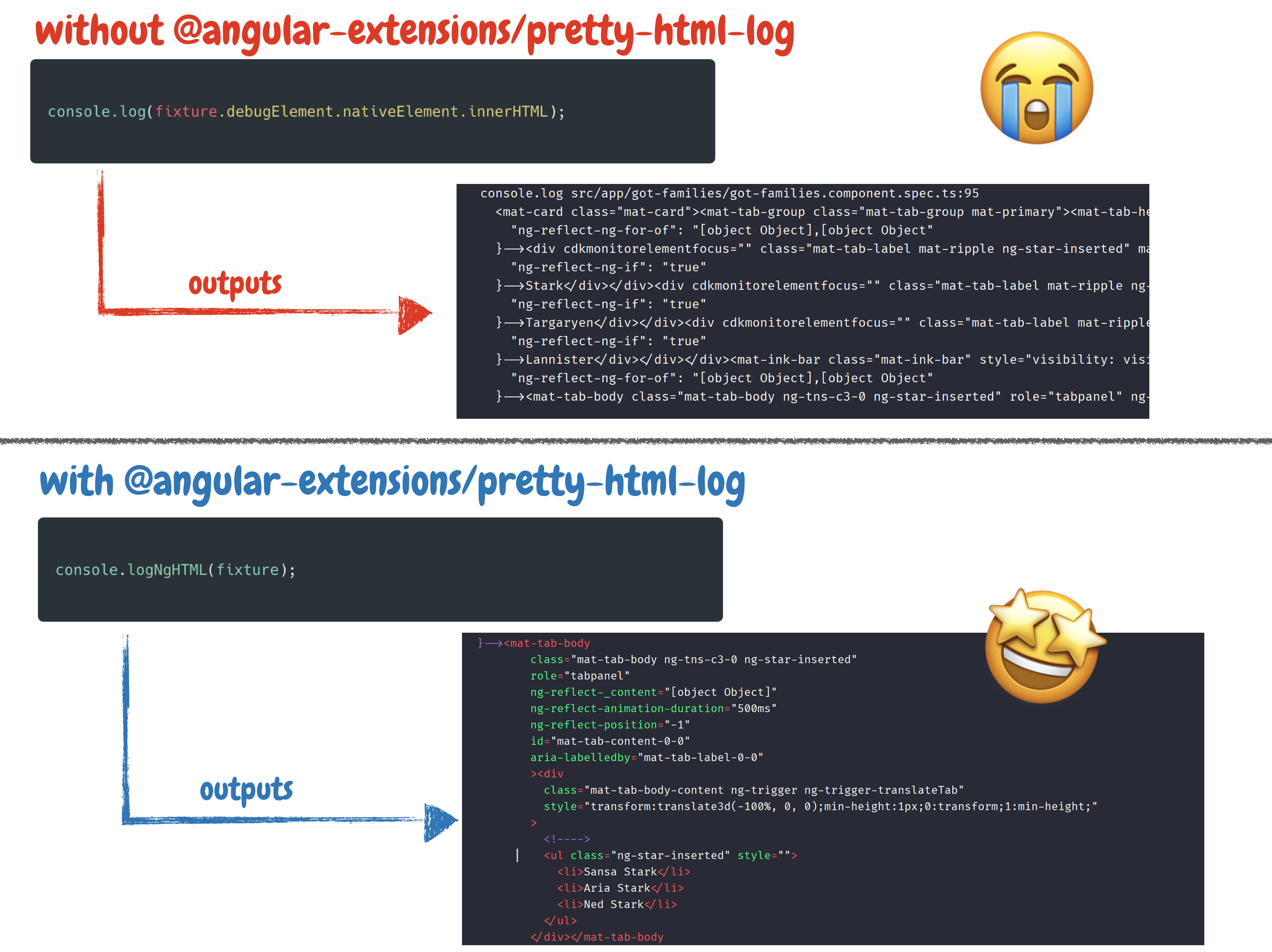Improved debugging of Angular component tests. The @angular-extension/pretty-html-log is a module that makes debugging component tests with Jest a breeze. It adds a console.logNgHTML method which pretty prints the innerHTML of a ComponentFixture, a DebugElement, a NativeElement or an HTML string.
When debugging component tests, it’s often necessary to inspect the DOM. The most common approach to do so is by using the good old console.log which has some downsides. First of all, it’s annoying always to type
fixture.debugElement.nativeElement.innerHTML;Moreover, the console.log statement doesn’t print the HTML in a very readable way. Therefore we still need to copy the string in a new HTML file and format it to be able to inspect it. Not with @angular-extensions/pretty-html-log
- patches the console and adds a new method
console.logNgHTML - pretty prints a fixture, debugElement, nativeElement or plain HTML string - you don't have to worry how to get to the HTML, just pass the thing you want to print to the
console.logNgHTMLmethod. - highlights the HTML
- in case you are using prettier (which you should ;)), pretty-html-log will pick up your prettier config and pretty print the HTML string based on your prettier configuration. 🤩
This module will only be used during development and can therefore be installed as a dev dependency.
npm i -D @angular-extensions/pretty-html-log This module is best used with Angular and Jest. Create a setupJest.ts file in your src directory and add the following line after your jest-preset-angular import.
import '@angular-extensions/pretty-html-log';This import adds a logNgHTML method to your console. You can then use this method during tests to pretty print ComponentFixtures, DebugElements, NativeElements or even plain HTML strings .
The console.logNgHTML() method has the following signature:
<T>( ngHTMLElement: NgHTMLElement<T>, enableComments = false, theme = THEMES.DRACULA ) | Property | Description |
|---|---|
| ngHTMLElement | Value to extract the html from and pretty print it to the console: ComponentFixture |
| enableComments (default: false) | When set to true we print the generated comments by Angular. For example: <!--bindings={"ng-reflect-ng-for-of":... |
| theme: (default: DRACULA) | pretty-html-log themes (DRACULA, VSCODE and MATERIAL) |
In your test you can simply write the following line.
console.logNgHTML(fixture.debugElement.query(By.css('mat-tab-body')));Which will print the following string to your console. Depending on your test configuration you might run into an issue with the patch of the console. In such cases its best to report an issue and use the logNgHTML function directly.
logNgHTML(fixture.debugElement.query(By.css('mat-tab-body')));Improved debugging of Angular component tests in Jest is a write up on AngularInDepth that shows how @angular-extensions/pretty-html-log is used and set up in a project.
Log the content innerHTML of a fixture
console.logNgHTML(fixture);of a debugElement (or multiple debugElements)
console.logNgHTML(fixture.debugElement);of a nativeElement (or multiple nativeElements)
console.logNgHTML(fixture.debugElement.nativeElement);or even a simple HTML string
console.logNgHTML('<h1>Foo</h1>');Angular adds some comments to our HTML file. Usually, when debugging our tests, we don't need them. Therefore they are not printed by default. However, there are cases where you want to print those comments. To do so, you can pass true as an additional flag tot he logNgHTML method.
console.logNgHTML(fixture, true);@angular-extensions/pretty-html-log allows you to print the html logs in different themes. Currently, we support (DRACULA, VSCODE and MATERIAL). The themes can be importet from pretty-html-log, the base library @angular-extensions/pretty-html-log depends on.
import { THEMES } from 'pretty-html-log'; console.logNgHTML(fixture, false, THEMES.VSCODE);I use the module but I don't get autocompletion when typing console.logNgHTML, furthermore I get the following error when I run my tests. console.logNgHTML is not a function. This is usually a sign that your tsconfig.json doesn't include the setupJest.ts file. Make sure that the setupJest.ts is included in your tsconfig.json.
{ "extends": "../tsconfig.json", "compilerOptions": { "outDir": "./out-tsc/spec", "types": ["jest", "node"], "esModuleInterop": true }, "files": ["polyfills.ts", "../jest.setup.ts"], "include": ["**/*.spec.ts", "**/*.d.ts"] }

